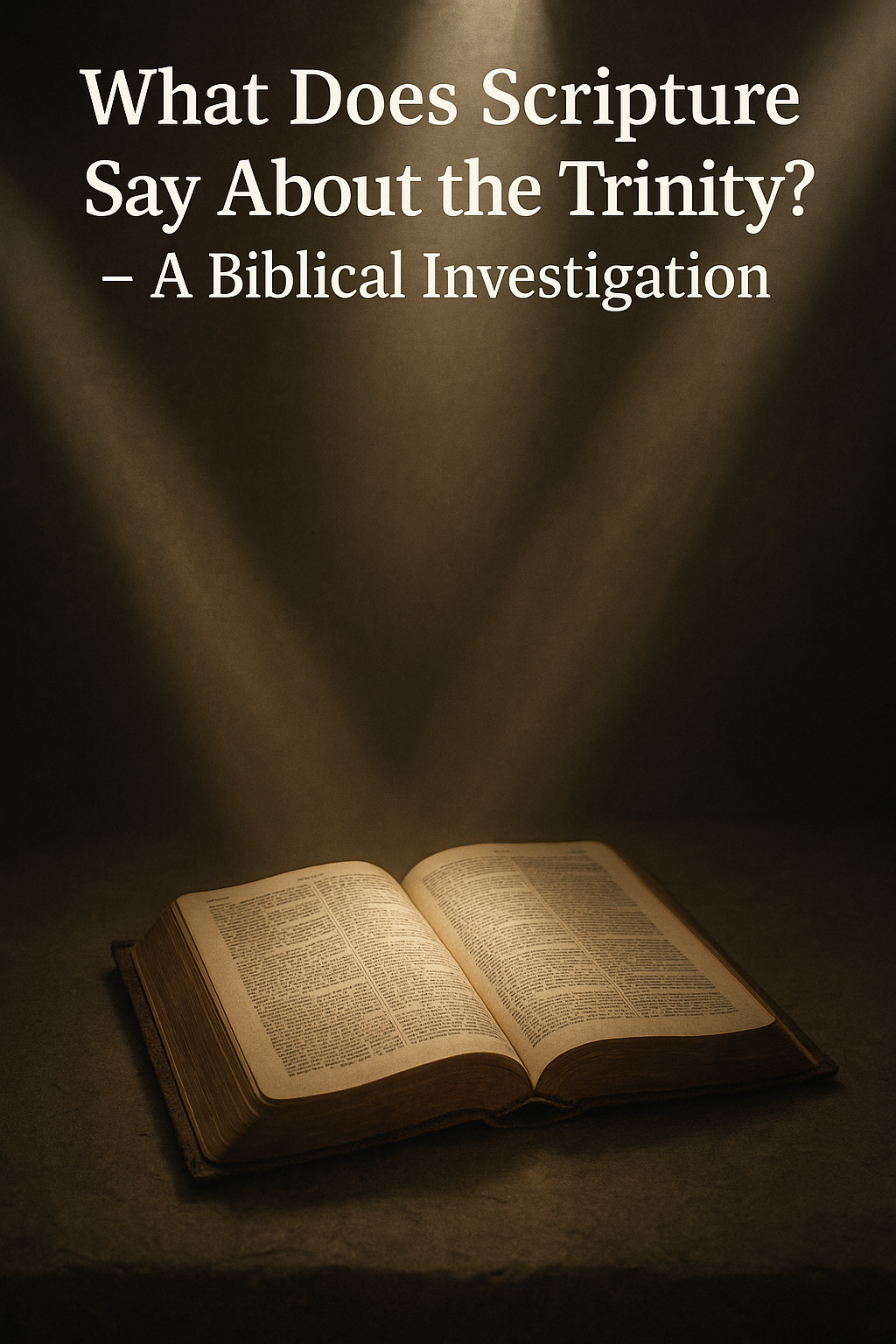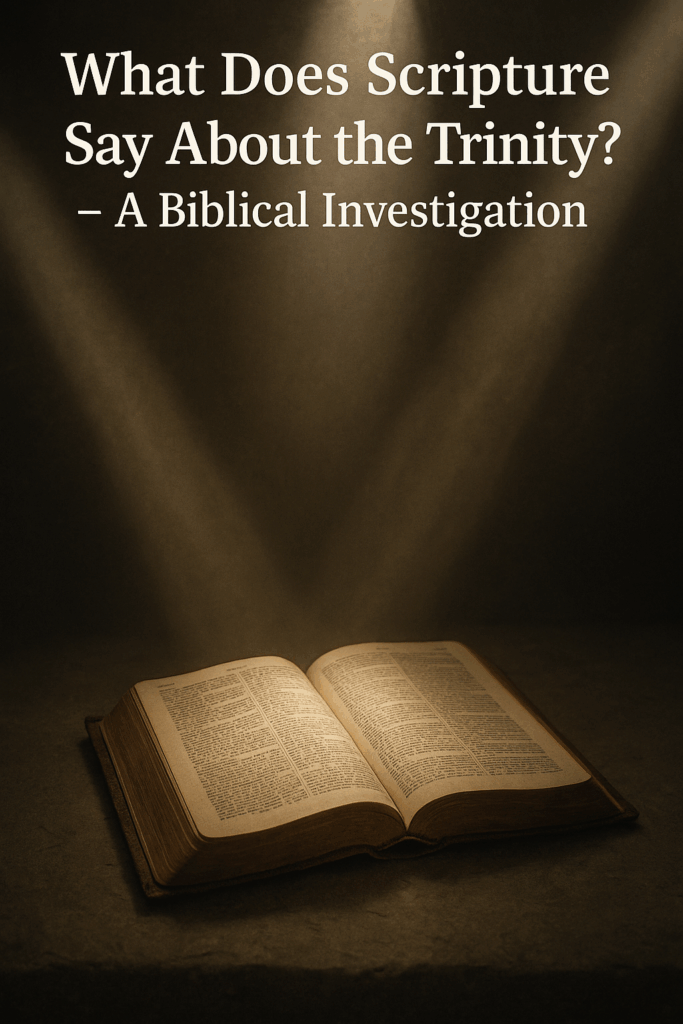Probably the most unnecessary favourite debate within Christian circles is the question of the Trinity.
This debate merely reflects one’s personal interpretation of biblical exegesis.
If we understand Holy Scripture through theological interpretation, we accept the doctrine of the Trinity as a foundation.
But if we understand Scripture from within Scripture itself, then such a way of thinking does not arise.
Even the beginnings of the so-called Christian doctrine of the Trinity emerged in the 4th century A.D.
Once again, it was a politically motivated decision of the church.
Sadly, it is impossible to establish a Trinity from the Bible; rather, there are quite a few verses that clearly speak against it.
Before we look at biblical passages, let us first see what the experts say about the creation of the Trinity:
(Source: https://www.trinitaet.com/hauptartikel/alle-ha/232-zitate, accessed 2023-03-16 at 11:29 a.m.)
“The Bible does not know the doctrine of the Trinity of God. The language of this doctrine is that of the early church, which adopted these terms from the language of classical Greek philosophy.”
— Shirley C. Guthrie Jr., Christian Doctrine, pp. 76–77
The academic world makes no secret of the matter—which thus becomes fact:
Theologies are shaped by Greek philosophy.

To fully grasp this fact, we must be aware of what philosophy means:
“The pursuit of knowledge concerning the meaning of life, the nature of the world, and the role of mankind in the world; a teaching or science about the meaning of life, the world, and mankind’s place in it.”
(Source: https://www.duden.de/rechtschreibung/Philosophie, accessed 2023-03-16 at 12:40 p.m.)
Philosophy is about finding answers to life. But its basis is the exclusion of God from the outset.
If we want to understand the Bible from a philosophical perspective, it’s not only a fundamental contradiction—it is the exact opposite of biblical teaching.
Jesus said very clearly:
“Jesus saith unto him, I am the way, the truth, and the life: no man cometh unto the Father, but by me.”
(John 14:6, Luther 1545)
Jesus teaches us plainly: He is the way, the truth, and the life.
So, if we want to follow Him, there is no place for any philosophy among us.
“Harnack states that the Christian community adopted much from Greek philosophy. It was these foreign elements that caused the doctrines of the Trinity and the Incarnation and similar ideas to develop—and not Jesus.”
— Millard Erickson on Adolf Harnack in God in Three Persons, p. 102
Again, it is shown: Theologies created the Trinity.
It was not a teaching of Jesus.
Teachings and views outside of Holy Scripture brought us the doctrine of the Trinity.
“The Trinitarian idea triumphed in the creeds of the churches not by the power of reason but through the words of Athanasius; it grew in the blood of thousands upon thousands of martyrs.”
— Thomas Jefferson, 3rd President of the United States
Jefferson passes on to us: the Trinity is the foundation for many murders committed in the name of the Church.
It is a very simple doctrine that was not spread by the teachings of Jesus.
“Our opponents sometimes claim that a belief should not be proclaimed as doctrine if it is not clearly stated in Scripture […] but the Protestant churches have accepted such dogmas as the Trinity, for which there is exactly no such scriptural proof.”
— Catholic theologian Graham Greene defending the dogma of Mary’s Assumption
The Catholic theologian bluntly clarifies this for Protestants (“our opponents”):
Protestant churches have accepted the dogma of the Trinity without any biblical evidence.
They have thus forgotten their own foundation: Sola Scriptura – Scripture alone!
“Today’s scholars generally agree that there is no doctrine of the Trinity as such in the Old or New Testament. […] It would go far beyond the intentions and thinking of the Old Testament to assume that a Christian doctrine of the late 4th or 13th century could be found there. Likewise, the New Testament contains no doctrine of a Triune God.”
— The HarperCollins Encyclopaedia of Catholicism, 1995, pp. 564–565
The academic world is completely unanimous: there is no foundation for the Trinity—nowhere.
Not even if we view Scripture culturally (its “intentions and ways of thinking”).
If the Bible truly supported the Trinity, our brethren from the southern kingdom—from the tribes of Judah and Benjamin—would surely hold a similar view or doctrine.
But they do not know anything like a Trinity.
So where does such an unbiblical doctrine come from?
Simply from theological teachings that were developed at the end of the 4th century.
“We find no clear, explicit statement about the Trinity of God in the New Testament […] The doctrine of the Trinity is not clearly contained in the Bible if we require proof texts. There is no proof text in the sense of a verse or passage that clearly teaches that there is one God in three persons.”
— Charles C. Ryrie (Trinitarian biblical scholar) in Understanding the Bible, p. 108
When I first read this quote, I thought:
“Wait a moment—didn’t John write something like that?”
At the time, I searched for a while and then found the passage in question:
“For there are three that bear record in heaven: the Father, the Word, and the Holy Ghost; and these three are one. And there are three that bear witness in earth: the Spirit, and the water, and the blood; and these three agree in one.”
(1 John 5:7–8 – incorrect Luther 1545, reprint from Lutherische Buchhandlung SILOAH e.V., 2021. Until a few years ago, this wording was found in all common Bible translations.)
As I continued to study this verse, I learned:
- a) This passage has long been a matter of dispute and is known as the “Comma Johanneum”
- b) This translation was introduced into our Bibles only between 1550 and 1600
- c) Anyone using the Textus Receptus as a basis has no way to translate it in this way
When I consulted the original Luther 1545, I found Luther’s actual wording:
“For there are three that bear witness on earth: the Spirit, and the water, and the blood; and these three agree in one.”
(1 John 5:7–8, Luther 1545)
So, we have no biblical foundation for a doctrine of the Trinity.
Even on modern websites (e.g. bibleserver.com or die-bibel.de) and in recent print editions, we now find the so-called Trinity verse only in the footnotes.
The current wording is:
“There are three that testify: the Spirit, the water and the blood; and the three are in agreement.”
(1 John 5:7–8, Einheitsübersetzung, https://www.die-bibel.de/bibeln/online-bibeln/lesen/EUE/1JN.5/1-Johannes-5, accessed 2023-03-16 14:18)
So we see very unambiguously:
There is no foundation for the doctrine of a Trinity.
Even Wikipedia states:
“Both Protestant and Roman Catholic theologians today generally agree—barring a few exceptions—that the Comma Johanneum does not belong to the original text of 1 John and at best represents an interpretation, dating from the 4th century onward, of the undoubtedly authentic passage about the ‘three earthly witnesses’ […] In most Bible translations available today, including Roman Catholic ones, the Comma Johanneum is either omitted entirely or relegated to the footnotes as a later addition.”
(https://de.wikipedia.org/wiki/Comma_Johanneum, accessed 2023-03-16 at 14:23)
Anyone who wants to base their Trinitarian belief on the Bible must reckon with this verse:
“I can of mine own self do nothing: as I hear, I judge: and my judgment is just; because I seek not mine own will, but the will of the Father which hath sent me.”
(John 5:30, Luther 1545)
So if our Redeemer can do nothing of Himself, how can He be almighty?
And if He is not almighty, is He then God?
That is something you must consider for yourself.


